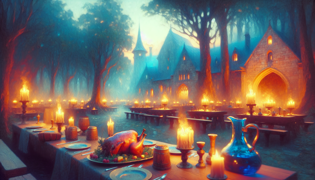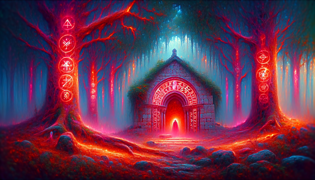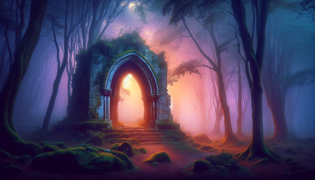The Legend of Crna Kraljica: Croatia’s Black Queen of Medvedgrad
Reading Time: 8 min

About Story: The Legend of Crna Kraljica: Croatia’s Black Queen of Medvedgrad is a Legend from croatia set in the Medieval. This Dramatic tale explores themes of Good vs. Evil and is suitable for All Ages. It offers Cultural insights. A medieval folktale of a cruel queen’s curse, witch-vampire transformation, and her hidden treasure in Medvedgrad’s woods.
Introduction
A cold wind whispered through the pines of Medvedgrad, carrying the scent of damp earth and old stone. This forest, shrouded in mist like a brooding secret, is home to the legend of Crna Kraljica, the Black Queen. She once ruled the surrounding valleys with a ruthless hand, her name spoken in fearful hushes. Locals still murmur an old idiom—“Ne pada snijeg da pokrije brijeg, nego da svaka zvijer pokaže svoj trag”—reminding them that every evil deed leaves a mark.
Generations later, the queen’s castle lies in ruins, but her spirit prowls the woods, transformed by dark witchcraft and vampiric hunger. Branches creak like ancient floorboards as she passes, leaving a chill in her wake. A hidden treasure, sealed by her blood oath, awaits a heart brave enough to face her. Among the villagers, young Ana, whose laughter once glowed like sunrise, volunteers to break the curse. Armed only with folklore, a silver locket, and unwavering courage, she steps into the shadows.
The forest floor is carpeted with needles that prick cold as iron, and the hush feels like a velvet cloak draped around her shoulders. Her first footsteps echo through time, bridging past cruelty and present hope.
Origins of the Black Queen
Long before her dark fate, Crna Kraljica was Mara, daughter of a noble Croatian lord whose ambitions soared higher than the castle turret. She was a child of laughter and rare compassion, yet her heart burned like wildfire when she tasted power. At court feasts she moved among dignitaries with grace, her raven-black hair shimmering under torchlight like a raven’s wing. Yet behind that gleaming smile lay a hunger for more—land, influence, and fear.
Her father’s death arrived like a thunderclap. Mara inherited the title and lands too vast for any one ruler. Her councilors whispered fears of her youth and ambition, calling her “Črna Kraljica” with grudging respect. With every decree, she tightened her grip: taxes rose, voices were silenced with swift cruelty, and dissenters vanished in the dead of night. The castle lanterns burned bright, feverish beacons against a world she sought to command.
(image)In the village of Lokve, folks would gather around hearth fires, words dancing like sparks in the gloom. An old woman’s shawl smelled of smoked paprika and sage as she told how the queen struck down rebels. “Bolje biti pijan nego star,” she’d chide, claiming it was better to die drunk than face her wrath sober. That line, crude as bark, became a warning and a grim joke.
One moonless evening, a traveler brought news of a dying forest—trees blackened near the castle walls, animals fleeing with fear. The queen’s heart, now hardened stone, drank that report like fine wine. She pronounced a banquet on the hill overlooking Medvedgrad and invited every noble, promising peace and unity. Torches were lit. Tables groaned under roasted boar, pomegranates, and wine red as blood.

Curse and Transformation
The feast’s laughter roared like a distant storm. Mara stood at the dais, her gown shimmering like oil slick. At midnight, she unveiled her secret: a blood pact with a sorceress of the Dinaric peaks, who granted immortality and power beyond mortal ken. Each noble’s goblet, tainted with a draught of darkness, sealed their fate. Cheers turned to gasps as eyes rolled back and villagers realized the banquet was a slaughter. Metal clashed in panic; velvet gowns were torn as blood pooled like spilled ink across the flagstones.
Inside a hidden chamber, the sorceress chanted runes that made walls sweat crimson. The queen felt her flesh grow cold and rigid, her senses heightening as she tasted iron on her tongue. Her nails elongated into talons, and teeth sharpened like knives. The Dinaric wind wailed through cracks in the masonry, carrying the scent of wet stone and dark magic.
(image)When dawn broke, the castle lay silent. Courtiers were gone—turned to ash or scattered beyond the hills. Mara emerged, no longer queen by birth but by nightmare, a witch-vampire whose heart was a locked chest of ice. Her castle fell into ruin; its towers leaned like weary knights resting after battle. Trees at its base twisted in protest, sap like tears oozing from their bark.
Legends say her laughter still echoes when the wind howls. Crooked paths in the forest sprout mushrooms shaped like skulls, and wolves avoid those trails, their fur tinged with frost upon retreat.

Haunting the Woods of Medvedgrad
Centuries passed, and only whispers of Crna Kraljica endured. The forest reclaimed paths once trodden by knights. Moss grew thick as old wool on fallen arches. Locals reported lantern lights flickering at twilight, with soft footsteps crunching pine needles—echoes of the queen’s eternal patrol.
Ana, guided by an oiled map found in her grandmother’s chest, stepped into this realm. Each breath she drew tasted of damp pine and distant rain. A branch snapped, startling her like a gunshot. Fear pooled in her stomach, heavier than any gold. Yet she pressed on, recalling the old saying: “Tko rano rani, dvije sreće grabi” —the early bird grabs two fortunes.
(image)The deeper she walked, the thicker the gloom. Shadows of twisted limbs looked like skeletal hands reaching for her cloak. A thin mist curled at her boots, cold as a grave. In that hush, she heard a voice whispering her name—a voice both sorrowful and accusing, as if the wind could speak her secret shame.
She found the ruins where the castle once stood. Crumbling stones jutted from the earth like broken teeth. At its heart, an archway led into a cavern mouth. From within came a faint glow. Ana’s pulse hammered; her chest felt as if wrapped in chains. She gripped the silver locket her mother had given her—its clasp worn from countless prayers.

The Hidden Treasure and Redemption
At the cavern’s threshold, Ana paused. The air reeked of damp stone and old magic, like a wet cloak left too long in the rain. She whispered a prayer and stepped inside. Crystals on the walls glowed faintly, painting the floor in hues of violet and green. Her footsteps echoed in a hollow drumbeat that matched her heartbeat.
Midway in, she encountered a pool so still it mirrored her face. But it wasn’t her own reflection; instead, the Black Queen’s pale visage stared back, eyes glimmering like embers in the dusk. Ana’s throat went dry, and her skin tingled as if touched by a thousand spiders.
(image)Drawing courage from the silver locket, she challenged the spirit. She spoke of mercy, of chance, and of release. The water rippled as the queen’s voice rose, a melody twisted by centuries of anguish. “Why should I trust kindness?” the queen hissed, her voice like metal scraping stone.
Ana stepped closer and laid the locket on the water’s edge. The queen’s form softened, and droplets of moonlight danced across her cheek. A single tear, a drop of pure silver, fell into the pool. In that moment, centuries of hatred dissolved like salt in rain.
The ground trembled, and ancient chains binding the treasure vault fell apart. Gold coins and jewels spilled across the cavern floor, their clink as bright as sunlight on waves. Ana welcomed the treasure, but more precious was the sight of the Black Queen kneeling in mist, freed at last from her curse. As dawn touched the cavern mouth, the queen’s figure rose and slowly faded, leaving behind only a single black rose that unfurled into midnight-blue petals.

Conclusion
Ana emerged from the forest as the first rays of dawn crowned the hills. The black rose, now a pale star in her palm, pulsed with gentle warmth. Locals greeted her with awe, their fear of shadows replaced by hope. In the village square, the treasure was shared: a fund to rebuild Medvedgrad’s chapel, supplies for every home, and a scholarship for children to study the old lore. The gold no longer belonged to greed but to community.
The rose, pressed in a leather-bound journal, became a symbol of forgiveness. Even when storms ravaged the land, its petals never wilted. People spoke of Ana’s courage and how even the darkest spirit can find dawn. The forest, once a prison of fear, bloomed again. Birds returned, their songs weaving a melody brighter than any torch.
And so the legend endures, carried on the wind like a lullaby. When dusk falls and mist gathers, you might hear a soft voice whisper: “Mercy turns darkness to light.” In those moments, you’ll know the Black Queen has finally found rest.

















